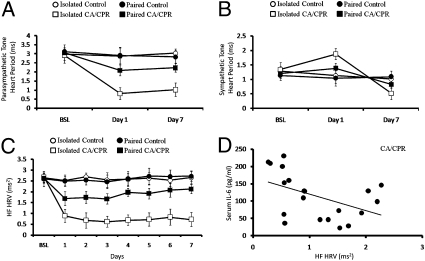Fig. 4.
Social influences on cardiac autonomic control. (A) Pharmacological evaluation of parasympathetic cardiac control revealed that the CA/CPR procedure resulted in decreased parasympathetic cardiac control at 24 h and 7 d following surgery as compared with the control group. This effect was primarily the result of significantly diminished parasympathetic cardiac control in socially isolated CA/CPR animals. (B) Pharmacological evaluation of sympathetic cardiac control. CA/CPR animals exposed to chronic social isolation displayed significantly increased levels of sympathetic cardiac control (decreased heart period) at 24 h following surgery as compared with pair-housed CA/CPR animals and hypothermic controls. However, socially isolated animals displayed diminished sympathetic cardiac control by 7 d following CA/CPR as compared with pair-housed counterparts and hypothermic controls, illustrating an important time-dependent effect of social housing conditions on autonomic outcome following CA/CPR. (C) Confirming the data presented above, parasympathetic tone, as measured through HF HRV, was diminished following CA/CPR. Although HF HRV levels returned to baseline levels by day 7 in pair-housed CA/CPR animals, HF HRV tone remained significantly lower than baseline presurgical recordings. (D) At 72 h following surgery, HF HRV values were significantly correlated with circulating IL-6 levels. The control group was comprised of sham-operated mice and mice that underwent hypothermic CA/CPR and as a result did not sustain neuroinflammation or neuronal damage. Data are presented as mean ± SEM.

